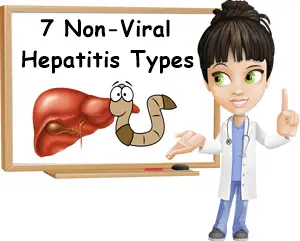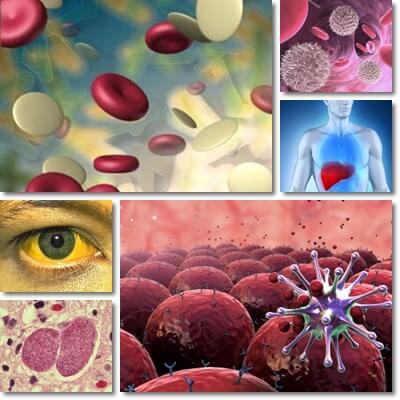By definition, hepatitis is the symptomatic or asymptomatic inflammation of the liver. There are two major types of hepatitis: viral hepatitis and non-viral hepatitis. Both viral and non-viral hepatitis have acute and chronic forms.
Viral hepatitis is by far the most common type and is caused by hepatitis viruses A, B, C, D or E. Non-viral hepatitis can be caused by a number of infectious agents, from bacteria to worms and parasites and is typically less common, but just as dangerous because it can progress to cirrhosis, liver failure and liver cancer.
What is non-viral hepatitis?
Non-viral hepatitis is hepatitis caused by infectious agents other than viruses (read more about what is viral hepatitis). Bacteria, worms and parasites, liver injury and even certain medicines can cause non-viral hepatitis via liver damage. Another difference between viral and non-viral hepatitis is that viral hepatitis is highly contagious, whereas non-viral hepatitis is not as contagious, hence the lower incidence of the later compared to the viral forms.

Types of non-viral hepatitis
Depending on the duration of the liver inflammation, non-viral hepatitis can be acute or chronic.
Acute non-viral hepatitis
The acute forms are temporary, while the chronic forms are long-term and present with the most side effects. For example, a herbal supplement containing a plant which is mildly toxic for the liver (which you might not even know about) can cause inflammation and lead to a form of non-viral hepatitis.
Once you stop taking the supplement, the inflammation should subside and the liver should regenerate itself. In this case, the hepatitis is acute and may or may not require treatment. Certain medication can also be toxic for the liver, but once you discontinue them, your liver should get back to normal.
Chronic non-viral hepatitis
Chronic non-viral hepatitis is an inflammation of the liver that lasts for months or years. For example, if you have a bacteria infection that affects the liver, but don’t treat it, the damage to the liver can become so severe over time that it renders the organ incapable of performing its functions.
The longer you leave the inflammation untreated, the higher the chances of liver failure, cirrhosis and liver cancer. Certain genetic diseases you live with your entire life can disrupt normal liver function and, as a result, cause long-term liver inflammation which is basically a form of chronic non-viral hepatitis.

What causes non-viral hepatitis?
Any microorganism with the potential to infect the liver can cause a form of non-viral hepatitis. Various natural or synthetic agents (compounds in plants, chemicals or medicines) that are toxic for the liver can cause non-viral hepatitis. This being said, read on to find out what are 7 of the most common types and causes of non-viral hepatitis you should know about:
1) Bacterial hepatitis
There are certain bacteria that can infect the liver and cause damage and inflammation that result in hepatitis. It is common for bacteria like Escherichia coli, salmonella or meningococcus to cause both acute and chronic types of non-viral hepatitis. Contaminated food and water, fleas, ticks are known to transmit such bacteria. Bacterial hepatitis presents itself as abscesses or lesions on the liver and requires antibiotic treatment and bed rest.
2) Parasitic hepatitis
It is a type of non-viral hepatitis caused by parasites and worms that commonly infect the bile ducts, gallbladder and liver. Liver flukes like the common liver fluke (Fasciola hepatica) or single-cell parasites like those that cause malaria commonly cause non-viral parasitic hepatitis. Parasites like these often live in the soil, water or the digestive tract of various animals.
Salad greens and leafy vegetables in general can transmit hepatitis-causing parasites because they are hard to wash properly and often eaten raw.
Lamb, beef and other meats may also be contaminated and eating improperly or insufficiently cooked meat can result in liver inflammation.
Experts recommend freezing meat prior to eating it for at least 24-48 hours and cooking it thoroughly (read more about worms and intestinal parasites). Boiling in particular is known to destroy parasites and their eggs.
Practicing good hygiene is also important to reduce the risk of getting liver parasites that cause hepatitis.
3) Toxic hepatitis
It is a type of non-viral hepatitis caused by exposure to hepatotoxic elements. Various herbs, environmental chemicals, medicines and alcohol are toxic for the liver and can cause liver damage. Some produce effects immediately, causing an acute form of the disease. Others produce effects over time and can cause chronic inflammation of the liver.
For example, paracetamol is hepatotoxic. A few years ago, it was prescribed to me for my fever because it was worryingly high and wouldn’t break. After only two days of treatment I started experiencing pain in my right side, nausea, weakness, inexplicable tiredness and a bit of jaundice, all signs of an acute form of hepatitis. I discontinued treatment and started improving in a matter of days and never took it again. Other medicines that cause hepatitis include certain antibiotics, cholesterol and antiviral medication etc.
Alcoholic hepatitis is also a form of toxic hepatitis
Alcoholic hepatitis is a common type of non-viral hepatitis caused by excessive alcohol consumption. Consuming large amounts can, in time, lead to liver damage, scarring, cirrhosis, liver failure and liver cancer. It is also a cause of fatty liver diseases which further put you at risk for chronic forms of hepatitis. The most common symptom is an enlarged liver.
4) Ischemic hepatitis
It is a type of non-viral hepatitis caused by poor blood flow to the liver that results in an altered liver function. Low blood pressure and other heart problems, infection or blood clots can cause too little blood to be delivered to the liver, which reduces its oxygen supply, resulting in liver shock. Treating the cause behind ischemic hepatitis is the most efficient form of treatment.
5) Non-viral hepatitis caused by hereditary conditions
By their very nature, certain inherited medical conditions affect normal liver function and can cause liver inflammation which is basically hepatitis. Because the hepatitis is caused by an genetic disease and not a virus, it is classified as non-viral hepatitis. For example, hemochromatosis is a genetic disorder that causes the body to accumulate too much iron which affects the heart, pancreas and liver, all organs that store iron. Hemochromatosis increases the likelihood of hepatitis and other liver problems.
6) Autoimmune hepatitis
It is a particular type of non-viral hepatitis that occurs when a person’s own immune system attacks liver cells. Autoimmune hepatitis can be acute or chronic and increases the sufferer’s likelihood to develop cirrhosis and liver cancer.
7) Fatty liver hepatitis
Excess weight, excessive belly fat in particular, hypertension, hyperglycemia, high cholesterol levels (metabolic syndrome), diabetes and obesity often lead to the accumulation of excess fat in the liver, causing fatty liver disease. This can progress to liver inflammation, resulting in a non-viral form of hepatitis called steatohepatitis or fatty liver disease. Over time, it can cause cirrhosis of the liver and other complications. Fatty liver disease can also be caused by excess alcohol consumption.
Conclusion
Non-viral hepatitis is an inflammation of the liver caused by agents other than viruses. Any living organism that can populate and infect the liver and adjacent organs like the gallbladder can cause hepatitis. Any element with hepatotoxic properties can cause hepatitis too. So basically bacteria, parasites, intestinal worms, certain medicines, herbs or diseases that somehow interfere with normal liver function can cause severe inflammation.
Most of the time, sufferers will exhibit classic signs and symptoms of hepatitis, but a small percentage will show no signs. Treating non-viral forms of hepatitis depends primarily on the type and cause of the disease.
